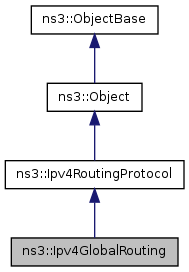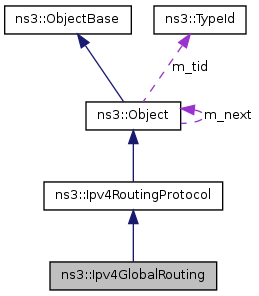Global routing protocol for IP version 4 stacks. More...
#include <ipv4-global-routing.h>


Public Member Functions | |
| Ipv4GlobalRouting () | |
| Construct an empty Ipv4GlobalRouting routing protocol,. | |
| virtual bool | RequestRoute (uint32_t ifIndex, Ipv4Header const &ipHeader, Ptr< Packet > packet, RouteReplyCallback routeReply) |
| Request that a check for a route bw performed and if a route is found that the packet be sent on its way using the pre-packaged send callback. | |
| virtual bool | RequestIfIndex (Ipv4Address destination, uint32_t &ifIndex) |
| Check to see if we can determine the interface index that will be used if a packet is sent to this destination. | |
| void | AddHostRouteTo (Ipv4Address dest, Ipv4Address nextHop, uint32_t interface) |
| Add a host route to the global routing table. | |
| void | AddHostRouteTo (Ipv4Address dest, uint32_t interface) |
| Add a host route to the global routing table. | |
| void | AddNetworkRouteTo (Ipv4Address network, Ipv4Mask networkMask, Ipv4Address nextHop, uint32_t interface) |
| Add a network route to the global routing table. | |
| void | AddNetworkRouteTo (Ipv4Address network, Ipv4Mask networkMask, uint32_t interface) |
| Add a network route to the global routing table. | |
| uint32_t | GetNRoutes (void) |
| Get the number of individual unicast routes that have been added to the routing table. | |
| Ipv4Route * | GetRoute (uint32_t i) |
| Get a route from the global unicast routing table. | |
| void | RemoveRoute (uint32_t i) |
| Remove a route from the global unicast routing table. | |
Static Public Member Functions | |
| static TypeId | GetTypeId (void) |
| This method returns the TypeId associated to ns3::Ipv4GlobalRouting. | |
Protected Member Functions | |
| void | DoDispose (void) |
Detailed Description
Global routing protocol for IP version 4 stacks.
In ns-3 we have the concept of a pluggable routing protocol. Routing protocols are added to a list maintained by the Ipv4L3Protocol. Every stack gets one routing protocol for free -- the Ipv4StaticRouting routing protocol is added in the constructor of the Ipv4L3Protocol (this is the piece of code that implements the functionality of the IP layer).
As an option to running a dynamic routing protocol, a GlobalRouteManager object has been created to allow users to build routes for all participating nodes. One can think of this object as a "routing oracle"; it has an omniscient view of the topology, and can construct shortest path routes between all pairs of nodes. These routes must be stored somewhere in the node, so therefore this class Ipv4GlobalRouting is used as one of the pluggable routing protocols. It is kept distinct from Ipv4StaticRouting because these routes may be dynamically cleared and rebuilt in the middle of the simulation, while manually entered routes into the Ipv4StaticRouting may need to be kept distinct.
This class deals with Ipv4 unicast routes only.
- See also:
- Ipv4RoutingProtocol
- GlobalRouteManager
Constructor & Destructor Documentation
| ns3::Ipv4GlobalRouting::Ipv4GlobalRouting | ( | ) |
Construct an empty Ipv4GlobalRouting routing protocol,.
The Ipv4GlobalRouting class supports host and network unicast routes. This method initializes the lists containing these routes to empty.
- See also:
- Ipv4GlobalRouting
Member Function Documentation
| void ns3::Ipv4GlobalRouting::AddHostRouteTo | ( | Ipv4Address | dest, | |
| Ipv4Address | nextHop, | |||
| uint32_t | interface | |||
| ) |
Add a host route to the global routing table.
- Parameters:
-
dest The Ipv4Address destination for this route. nextHop The Ipv4Address of the next hop in the route. interface The network interface index used to send packets to the destination.
- See also:
- Ipv4Address
| void ns3::Ipv4GlobalRouting::AddHostRouteTo | ( | Ipv4Address | dest, | |
| uint32_t | interface | |||
| ) |
Add a host route to the global routing table.
- Parameters:
-
dest The Ipv4Address destination for this route. interface The network interface index used to send packets to the destination.
- See also:
- Ipv4Address
| void ns3::Ipv4GlobalRouting::AddNetworkRouteTo | ( | Ipv4Address | network, | |
| Ipv4Mask | networkMask, | |||
| Ipv4Address | nextHop, | |||
| uint32_t | interface | |||
| ) |
Add a network route to the global routing table.
- Parameters:
-
network The Ipv4Address network for this route. networkMask The Ipv4Mask to extract the network. nextHop The next hop in the route to the destination network. interface The network interface index used to send packets to the destination.
- See also:
- Ipv4Address
| void ns3::Ipv4GlobalRouting::AddNetworkRouteTo | ( | Ipv4Address | network, | |
| Ipv4Mask | networkMask, | |||
| uint32_t | interface | |||
| ) |
Add a network route to the global routing table.
- Parameters:
-
network The Ipv4Address network for this route. networkMask The Ipv4Mask to extract the network. interface The network interface index used to send packets to the destination.
- See also:
- Ipv4Address
| void ns3::Ipv4GlobalRouting::DoDispose | ( | void | ) | [protected, virtual] |
This method is called by Object::Dispose or by the object's destructor, whichever comes first.
Subclasses are expected to implement their real destruction code in an overriden version of this method and chain up to their parent's implementation once they are done. i.e., for simplicity, the destructor of every subclass should be empty and its content should be moved to the associated DoDispose method.
Reimplemented from ns3::Object.
| uint32_t ns3::Ipv4GlobalRouting::GetNRoutes | ( | void | ) |
Get the number of individual unicast routes that have been added to the routing table.
- Warning:
- The default route counts as one of the routes.
| Ipv4Route* ns3::Ipv4GlobalRouting::GetRoute | ( | uint32_t | i | ) |
Get a route from the global unicast routing table.
Externally, the unicast global routing table appears simply as a table with n entries. The one sublety of note is that if a default route has been set it will appear as the zeroth entry in the table. This means that if you add only a default route, the table will have one entry that can be accessed either by explicity calling GetDefaultRoute () or by calling GetRoute (0).
Similarly, if the default route has been set, calling RemoveRoute (0) will remove the default route.
- Parameters:
-
i The index (into the routing table) of the route to retrieve. If the default route has been set, it will occupy index zero.
- Returns:
- If route is set, a pointer to that Ipv4Route is returned, otherwise a zero pointer is returned.
- See also:
- Ipv4Route
- Ipv4GlobalRouting::RemoveRoute
| static TypeId ns3::Ipv4GlobalRouting::GetTypeId | ( | void | ) | [static] |
This method returns the TypeId associated to ns3::Ipv4GlobalRouting.
No Attributes defined for this type.
No TraceSources defined for this type.
Reimplemented from ns3::Object.
| void ns3::Ipv4GlobalRouting::RemoveRoute | ( | uint32_t | i | ) |
Remove a route from the global unicast routing table.
Externally, the unicast global routing table appears simply as a table with n entries. The one sublety of note is that if a default route has been set it will appear as the zeroth entry in the table. This means that if the default route has been set, calling RemoveRoute (0) will remove the default route.
- Parameters:
-
i The index (into the routing table) of the route to remove. If the default route has been set, it will occupy index zero.
- See also:
- Ipv4Route
- Ipv4GlobalRouting::GetRoute
- Ipv4GlobalRouting::AddRoute
| virtual bool ns3::Ipv4GlobalRouting::RequestIfIndex | ( | Ipv4Address | destination, | |
| uint32_t & | ifIndex | |||
| ) | [virtual] |
Check to see if we can determine the interface index that will be used if a packet is sent to this destination.
This method addresses a problem in the IP stack where a destination address must be present and checksummed into the IP header before the actual interface over which the packet is sent can be determined. The answer is to implement a known and intentional cross-layer violation. This is the endpoint of a call chain that started up quite high in the stack (sockets) and has found its way down to the Ipv4L3Protocol which is consulting the routing protocols for what they would do if presented with a packet of the given destination.
If there are multiple paths out of the node, the resolution is performed by Ipv4L3Protocol::GetIfIndexforDestination which has access to more contextual information that is useful for making a determination.
This method will return false on a multicast address.
- Parameters:
-
destination The Ipv4Address if the destination of a hypothetical packet. This may be a multicast group address. ifIndex A reference to the interface index over which a packet sent to this destination would be sent.
- Returns:
- Returns true if a route is found to the destination that involves a single output interface index, otherwise returns false indicating that the next routing protocol should be consulted.
Implements ns3::Ipv4RoutingProtocol.
| virtual bool ns3::Ipv4GlobalRouting::RequestRoute | ( | uint32_t | ifIndex, | |
| Ipv4Header const & | ipHeader, | |||
| Ptr< Packet > | packet, | |||
| RouteReplyCallback | routeReply | |||
| ) | [virtual] |
Request that a check for a route bw performed and if a route is found that the packet be sent on its way using the pre-packaged send callback.
The source and destination IP addresses for the packet in question are found in the provided Ipv4Header. There are two major processing forks depending on the type of destination address.
If the destination address is unicast then the routing table is consulted for a route to the destination and if it is found, the routeReply callback is executed to send the packet (with the found route).
If the destination address is a multicast, then the method will return false.
- Parameters:
-
ifIndex The network interface index over which the packed was received. If the packet is from a local source, ifIndex will be set to Ipv4RoutingProtocol::IF_INDEX_ANY. ipHeader the Ipv4Header containing the source and destination IP addresses for the packet. packet The packet to be sent if a route is found. routeReply A callback that packaged up the call to actually send the packet.
- Returns:
- Returns true if a route is found and the packet has been sent, otherwise returns false indicating that the next routing protocol should be consulted.
- See also:
- Ipv4GlobalRouting
- Ipv4RoutingProtocol
Implements ns3::Ipv4RoutingProtocol.
The documentation for this class was generated from the following files:
- src/internet-stack/ipv4-global-routing.h
- doc/introspected-doxygen.h
 1.7.1
1.7.1